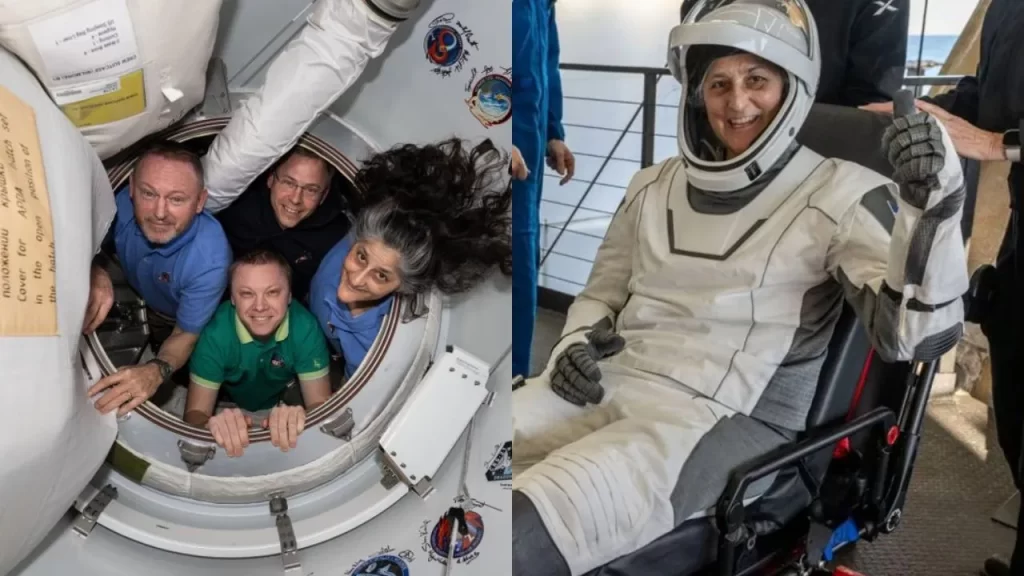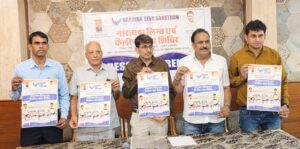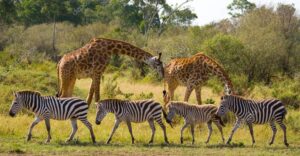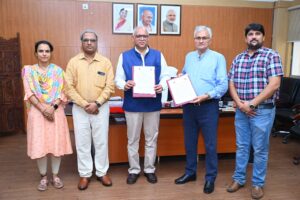
Yes, it may seem fun to see astronauts floating in the air inside the International Space Station, but the effect of the lack of gravity there remains on the astronauts for a long time after returning to Earth and they have to face challenges like nausea, dizziness, difficulty in talking and walking. Something similar may happen to NASA astronauts Sunita Williams and Butch Wilmore and Russian astronaut Alexander Gorbunov.
NASA astronauts Sunita Williams and Butch Wilmore and Russian astronaut Alexander Gorbunov have returned to Earth on Wednesday in SpaceX’s Dragon spacecraft.
At the same time, many astronauts who have traveled under various space missions have talked about facing challenges like difficulty in walking, problems in seeing, dizziness and a condition called ‘baby feet’ after returning to Earth and astronauts Sunita Williams and Butch Wilmore and Russian astronaut Alexander Gorbunov will also not be untouched by this.
‘Baby feet’ means that the thick part of the skin of the astronauts’ soles comes out and their soles become as soft as a child’s.
Houston-based ‘Baylor College of Medicine’ said about the changes in the body in space, “When astronauts return to Earth, they have to immediately adapt to the gravity of the Earth again. They may have problems standing, stabilizing their vision, walking and turning. Astronauts returning to Earth are often made to sit on a chair immediately after returning to Earth for their better adaptation to new conditions.”
On the other hand, astronauts take several weeks to acclimatise themselves to life on Earth. The vestibular organ located inside the ear helps humans keep their bodies balanced while walking on Earth by sending information about gravity to the brain. The Japanese space agency JAXA said, “Due to low gravity in space, the information received from the vestibular organs changes.”
It is believed that this confuses the brain and causes space sickness (a health problem faced by many people who travel in space). When you return to Earth, you experience the effects of Earth’s gravity again and thus sometimes get gravity sickness, the symptoms of which are similar to space sickness.
On Earth, gravity pulls blood and other bodily fluids towards the lower part of the body, but due to weightlessness in space, these fluids accumulate in the upper parts of the body of astronauts and due to this they look swollen. JAXA said, “Astronauts returning to Earth often feel dizzy when standing up. This condition is called ‘orthostatic hypotension’. This happens because gravity on Earth is stronger than in space and it is more difficult for blood to reach the head from the heart.”
At the same time, due to lack of gravity, there is a significant and often irreparable decrease in bone density. According to NASA, if astronauts do not take precautions to overcome this deficiency, the density of weight-bearing bones decreases by about one percent every month in space. To deal with this problem, there is a strict exercise regime for astronauts on the International Space Station.
NASA said, “Astronauts are required to exercise for two hours a day using a ‘treadmill’ or stationary bicycle to prevent damage to bones and muscles due to zero gravity. If this exercise is not done, astronauts will be unable to walk or stand after returning to Earth after floating in space for months.”
Canadian astronaut Chris Hadfield said that he had difficulty talking on returning from the International Space Station in 2013 due to the weightlessness of the tongue in space. Hadfield said, “Immediately after returning to Earth, I could feel the weight of my lips and tongue and I had to change my way of talking. I hadn’t realized that I had gotten used to talking with a weightless tongue.”
Due to a weakened immune system, astronauts are at a higher risk of infection and disease upon returning to Earth. In such a situation, astronauts Sunita Williams and Butch Wilmore, who have returned from space, and Russian astronaut Alexander Gorbunov will have to take good care of themselves.
सुनीता विलियम्स को अब किन चुनौतियों का सामना करना पड़ेगा, अनुकूलन प्रक्रिया में लग सकते हैं कई सप्ताह
हालांकि अंतरिक्ष यात्रियों को अंतर्राष्ट्रीय अंतरिक्ष स्टेशन (ISS) के अंदर तैरते हुए देखना मज़ेदार लग सकता है, लेकिन भारहीनता के प्रभाव पृथ्वी पर लौटने के बाद उनके शरीर पर लंबे समय तक प्रभाव डाल सकते हैं। अंतरिक्ष यात्रियों को अक्सर मतली, चक्कर आना और चलने और बोलने में कठिनाई जैसी चुनौतियों का सामना करना पड़ता है। नासा के अंतरिक्ष यात्री सुनीता विलियम्स और बुच विल्मोर के साथ-साथ रूसी अंतरिक्ष यात्री अलेक्जेंडर गोरबुनोव के साथ भी ऐसा ही हो सकता है, जो स्पेसएक्स के ड्रैगन अंतरिक्ष यान में सवार होकर पृथ्वी पर लौटे हैं।
विभिन्न मिशनों के कई अंतरिक्ष यात्रियों ने अपनी वापसी पर चलने में परेशानी, दृष्टि संबंधी समस्या, चक्कर आना और बोलचाल की भाषा में “बेबी फीट” के रूप में जानी जाने वाली स्थिति जैसी कठिनाइयों का अनुभव करने की सूचना दी है। “बेबी फीट” का मतलब है अंतरिक्ष यात्रियों के पैरों के तलवों की मोटी त्वचा का छिल जाना, जिसके परिणामस्वरूप एक बच्चे की त्वचा जैसी नरम त्वचा हो जाती है।
ह्यूस्टन में बेलर कॉलेज ऑफ मेडिसिन के अनुसार, पृथ्वी पर लौटने पर, अंतरिक्ष यात्रियों को गुरुत्वाकर्षण के साथ जल्दी से फिर से समायोजित करना पड़ता है, जिससे खड़े होने, अपनी दृष्टि को स्थिर करने, चलने और मुड़ने में चुनौतियाँ हो सकती हैं। इस समायोजन को सुविधाजनक बनाने के लिए, अंतरिक्ष यात्रियों को अक्सर लैंडिंग के तुरंत बाद बैठा दिया जाता है।
अनुकूलन प्रक्रिया
अनुकूलन प्रक्रिया में कई सप्ताह लग सकते हैं। आंतरिक कान में वेस्टिबुलर अंग मस्तिष्क को गुरुत्वाकर्षण के बारे में जानकारी भेजकर संतुलन बनाए रखने में मदद करता है। जापानी अंतरिक्ष एजेंसी JAXA बताती है कि अंतरिक्ष में कम गुरुत्वाकर्षण वातावरण इन अंगों से प्राप्त जानकारी को बदल देता है, जो मस्तिष्क को भ्रमित कर सकता है और बीमारी का कारण बन सकता है। पृथ्वी पर लौटने पर, अंतरिक्ष यात्रियों को गुरुत्वाकर्षण बीमारी का अनुभव हो सकता है, जिसके लक्षण अंतरिक्ष बीमारी (स्पेस सिकनेस) के समान होते हैं।
अंतरिक्ष में, गुरुत्वाकर्षण के कारण शरीर के ऊपरी हिस्से में तरल पदार्थ जमा हो जाते हैं, जिससे सूजन दिखाई देती है। JAXA ने नोट किया कि अंतरिक्ष यात्रियों को अक्सर ऑर्थोस्टेटिक हाइपोटेंशन नामक स्थिति के कारण खड़े होने पर चक्कर आते हैं। ऐसा इसलिए होता है क्योंकि पृथ्वी पर मजबूत गुरुत्वाकर्षण खिंचाव रक्त को हृदय से सिर तक प्रसारित करना अधिक चुनौतीपूर्ण बनाता है।
हड्डी के घनत्व में कमी
इसके अतिरिक्त, गुरुत्वाकर्षण की कमी के परिणामस्वरूप हड्डियों के घनत्व में महत्वपूर्ण और अक्सर अपरिवर्तनीय कमी होती है। नासा का कहना है कि अगर अंतरिक्ष यात्री निवारक उपाय नहीं करते हैं, तो अंतरिक्ष में रहने के दौरान वजन सहन करने वाली हड्डियों का घनत्व हर महीने लगभग एक प्रतिशत कम हो सकता है।
इससे निपटने के लिए, ISS पर अंतरिक्ष यात्री एक सख्त व्यायाम व्यवस्था का पालन करते हैं, जिसमें हड्डियों और मांसपेशियों के स्वास्थ्य को बनाए रखने के लिए ट्रेडमिल या स्थिर साइकिल पर प्रतिदिन दो घंटे व्यायाम करना आवश्यक होता है। इस व्यायाम के बिना, अंतरिक्ष यात्री महीनों तक भारहीन रहने के बाद चलने या खड़े होने में संघर्ष कर सकते हैं।
बोलने में कठिनाई
कनाडाई अंतरिक्ष यात्री क्रिस हैडफील्ड ने साझा किया कि 2013 में ISS से लौटने पर, उन्हें अंतरिक्ष में अपनी जीभ के भारहीन होने के कारण बोलने में कठिनाई का अनुभव हुआ। उन्होंने कहा, “पृथ्वी पर लौटने के तुरंत बाद, मैं अपने होठों और जीभ का वजन महसूस कर सकता था, और मुझे अपने बोलने के तरीके बदलाव करना पड़ा। मुझे एहसास नहीं हुआ था कि मैं भारहीन जीभ से बात करने का आदी हो गया था।”
इसके अलावा, अंतरिक्ष यात्रियों को पृथ्वी पर लौटने के बाद कमज़ोर प्रतिरक्षा प्रणाली के कारण संक्रमण और बीमारी का अधिक जोखिम होता है। इसलिए, सुनीता विलियम्स, बुच विल्मोर और अलेक्जेंडर गोरबुनोव को जमीन पर जीवन के लिए पुनः समायोजित होते समय अपने स्वास्थ्य के प्रति अतिरिक्त सावधानी बरतने की आवश्यकता होगी।







